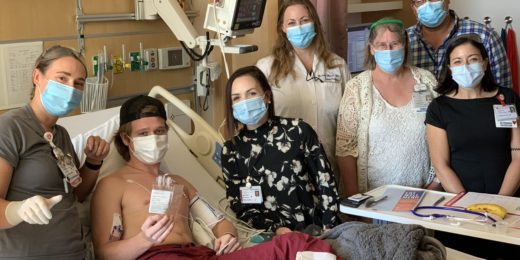Stanford physicians have published the first study of gay men's experiences with using assisted reproductive technology to have children.
Author: Erin Digitale
Routing cancer cells to the right path may boost treatment
Researchers at Stanford Medicine discover a certain molecule renders a type of cancer cell more susceptible to treatment.
Precision medicine predicts best ulcerative colitis care for teens
Stanford researchers are developing a faster way to match each ulcerative colitis patient with the treatment that will work best for them.
High-risk babies don’t always get the follow-up care they need
A study shows that some high-risk infants don't receive the necessary follow up care and there are inequities in who attends the appointments.
Yuck! Don’t vape that
Scientists have found that teens, young adults and adults are vaping substances that aren't meant to be inhaled.
Cone snail venom and … insulin?
People with diabetes must plan meals and insulin doses, a hassle that may one day be eliminated thanks to cone snail venom.
Changing infant care to improve newborns’ health in India
Modifying traditional infant massages led to more weight gain and fewer illnesses among newborns in a Stanford-led community study in India.
From loss comes hope: Pediatric brain tumor treatment shows promise
Research from early clinical trials of pediatric glioma patients shows that altered immune cells can fight the deadly brainstem tumor.
Stanford team finds benefits to online autism treatment
Creating online worlds tailored to kids' interests allowed Stanford therapists to use telehealth to motivate children with autism to talk.
Kids fare better with early use of diabetes technology
Providing continuous glucose monitors to kids with new type 1 diabetes improves their blood sugar levels a year later, a Stanford study showed
New online game teaches teens about vaping dangers
A Stanford adolescent medicine expert helped develop an educational game to reduce tobacco use in middle school and high school students.
Youngsters with ADHD often don’t receive best treatment
Families of young kids with ADHD should get parenting-skills therapy before other treatments, but this happens infrequently, a study found.
Children born early at risk from too much screen time
More than two hours of daily screen time was linked to lower IQ and behavioral issues in 6- and 7-year-olds born very prematurely.
Uneven health care access stresses DACA families, study finds
Immigrants living in the U.S. without legal status are often reluctant to get medical care even when they have DACA protection, study shows.
Stanford pediatrician answers COVID-19 vaccine questions
A Stanford pediatric infectious disease expert is highlighted in a new campaign to answer parents' questions about COVID-19 vaccines.
Wildfire smoke exposure raises risk for preterm birth
Exposure to wildfire smoke increases a pregnant woman's risk of giving birth three or more weeks early, a new Stanford study found.

















